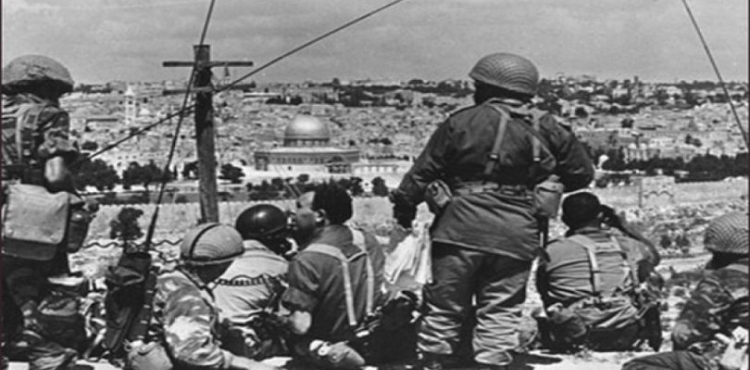In the Al-Wahdat Palestinian refugee camp in Jordan, 63-year-old refugee Nayef Mahfouz recalls the route he and his father used to the camp´s well-known "shower" coffee.
"In that coffee, those days of 1967, which preceded the setback, everyone was staring at the big radio, in moments of silence, broken only by the voice of the announcer, who was reporting the news of the West Bank and Jerusalem," he tells Jerusalem Press.
At the age of 11, Nayef was trying with his imagination to draw all those scenes that come out of the radio, and from the adult conversations afterwards, describing the moments: "I was walking around in someone´s orchard, maybe i would taste an orange of his enthusiasm as he talks about him, describes him, and dreams of returning to him, while another brags about his grandfather´s house with his big rooms and windows that are not left behind by the sun until he is gone."
It was not only the "shower" coffee, the gathering place for those seeking any hope of a return, which might be painted by the guns of the guerrillas and the Arabs, says "Nayef", there was also the Center for Social Youth, which later became the Club of Units, where intellectuals from the Palestinian community, discussed among themselves, and listened to the radio.
"We were waiting for the moment when the victory over Israel was declared, but on June 5, 1967, enemy aircraft began bombing the capital Amman, while Jordanian cannons were trying to repel the attack, but in the three days following the attack, we began to hear that people were moving away from the Camps of the Jordan Valley and Ramallah towards eastern Jordan," he said.
Nayef recalls his views in those days: "Families left in their clothes only, while people gathered in the streets, where Jordan did their duty to them."
That period saw the beginning of the birth of new camps in Jordan, such as Al-Baqaa, Jarch, Gaza and others, where UNRWA considered them displaced and began to give them cards.
"I didn´t realize at the time what it means to lose the rest of Palestine, in addition to parts of the Arab countries, because I was a 4-year-old child," said Ahmed al-Bash, a Palestinian researcher and journalist, and director of the Ajyal Center for Documentation and Studies.
The memories of the "Bash" return to the first steps of asylum in the orchards surrounding Yarmouk camp, and then the journey of displacement to The Neirab camp, fearing that the occupation tanks would follow them to Damascus.
"I´ve been listening to these witnesses pour their anger on the Arab regimes, insulting and mocking their miserable media, and also accusing him of conspiring against their people and their cause," he said.
"They were also talking about the state of frustration swaying all the peoples at the time, and the collapse of morale and the psychological defeat of the masses before the military defeat of the armies, as they were saying that the widespread corruption in these Arab armies at the time was one of the most important causes of defeat," he said.
Today, in the face of what the occupation translates into reality by force and hegemony over the land, it is only a literal implementation of the outcome of the Palestinian and Arab setback, the annexation of Jerusalem and its recognition as the eternal capital of the entity, the annexation of the Palestinian territories and large parts of the West Bank, the targeting of palestinian refugees, the Palestinian camp, UNRWA, and the accelerated normalization with Arab regimes, far from that.
"Yes, the setbacks are on our heads, one setback after another, during which we have been in harmony with the Zionist occupation since the Oslo Accords, and we have lived and lived and lived in a state of fragmentation and political Palestinian division, to the misery of Palestinian refugees everywhere, to the poor, divided Arab reality, which they have occupied with its internal issues, to scrambling for normalization with the entity." Constant setbacks that we pay for every day.
However, "In the end, the peoples remain haunted by hope, despite this halak, blackness and despair, and the will of the Palestinian people, and the oppressed Arab peoples remain the highest, but this requires us to unite all the different efforts, in which all the components of this great people participate, and in accordance with clear strategies of objectives."
Friday (June 5) marks the 53rd anniversary of what is known as the Setback, or the 1967 war, which ended with Israel´s defeat of Arab armies and its occupation of large swathes of Palestinian, Egyptian and Syrian territories.
Despite these long years of war, the repercussions continue, as Israel continues its occupation of the West Bank, Gaza Strip, and the Syrian Golan Heights, despite international Security Council resolutions calling on it to withdraw.
The anniversary also comes as Israel moves toward swathes of the West Bank next month.












